We are thrilled to share our conversation with legendary burlesque star and pin-up model Dita Von Teese.
Her upcoming show, Night of the Teese – A Cinematic Special, filmed at the illustrious Orpheum Theatre in downtown Los Angeles during the pandemic, will be streaming for one weekend only Friday October 1st – Sunday October 3rd, featuring an all-star cast of friends and collaborators that the reigning Queen of Burlesque has worked with during her 30-plus-year career, in addition to some exciting new talent.
Von Teese connected with director Quinn Wilson, a queer rising star who also happens to be Lizzo’s creative director, to create a one-of-a-kind intimate experience that captures the unique vision and energies of her hand-picked performers. With a sharp focus on presenting the best of the best in burlesque, the work spans the gender spectrum while celebrating intergenerational bodies, backgrounds, and performance styles.
It’s a much needed return to magic, glitz and glam after almost two years when the closest thing for most of us to a scintillating experience was not having to wear bottoms to a staff meeting.
In addition to the long overdue streaming experience, Von Teese has just arrived in Paris to begin her stint as a contestant on Dancing With The Stars.
We caught up with the down-to-earth diva about how that particular experience may not be going quite to plan, her humble beginnings, as well as what she’s learned — and taught — in her fabulously flashy decades-long career as a glamour girl or, as she’d say, a “fancy pants stripper”!
Read the full Q&A with Dita Von Teese after the jump!
�
Hi Dita! I hear you’re currently in rehearsals for Dancing With The Stars, Paris! That must be intense. How’s it been going so far?
I’m not actually working yet! I’m fully vaccinated, but still I tested positive for COVID, so I’ve had to be in lockdown, which is not cool.
That’s awful! How did that all go down?
Basically, we’re all supposed to be in rehearsals and filming all the promos and then suddenly I felt like I had allergies or a cold. I was doing all the physicals and tests to make sure if I was healthy enough for the show, but I knew I felt sick feel and asked if I should have a COVID test, but the doctors were like, “No, it’s normal. You took a plane. That’s normal for you to feel a little bit sniffly.” So anyway, next thing you know, I went to the pharmacy myself and tested positive!
That’s awful that they weren’t keen for you to take the test! You’ve been performing since the early ’90s. Can you tell me about how you’ve seen the art of burlesque transform over your time working in the craft?
I feel like I’ve watched a very big arc in burlesque for as long as I’ve been doing it. In the ’90s, I was performing in these big fancy strip clubs across the United States, and we also had the exotic dancer convention where girls were doing big shows with like fire or ice skating — just really big burlesque shows that weren’t necessarily vintage pin-up style, which they definitely weren’t all.
But in the earlier days of putting on a big burlesque show, it sort of emerged from the whole “feature dancer” world from clubs with headlining strippers in the ’80s and ’90s, and it existed very much under the male gaze.
I’ve always felt like burlesque is a place of inclusion, especially with the Burlesque Hall of Fame, but in the early 2000s is when I really felt like things shifted a lot, where there was more of a female audience. I definitely felt there were moments that burlesque was a buzzword, you know, like when, like when the movie Burlesque came out and The Pussycat Dolls were doing their thing and at that point I did sort of fear the whole scene was being sanitized and at risk of fizzling out.
But surely the visibility you generated around burlesque contributed to its buzz-worthiness?
Yeah, I mean, that’s why I hate saying it about myself. I get anxiety saying it about myself and I know sometimes there’s probably a lot of neo-burlesque people that don’t like me at all, but if you’re going to give me one thing, I did make it a little bit more palatable for people when striptease was not very popular.
I did try to stand up for what burlesque really is when that movie came out, because it didn’t represent anything of what modern burlesque or even vintage burlesque was about.
So, I’ve tried to stand up for the scene and the community and speak to what it really is like, historically, whenever mainstream media tried to capitalize on it and turn it into something else.
In a similar way to drag, there seems to be a DIY element to burlesque, where it’s about creating this fantasy out of bits and bobs. Do you feel like you are in touch with that community or the DIY elements of this performance culture?
Here’s the thing: when Catherine D’Lish and I started working together in 2000, and even before that, we were the first ones to like put rhinestones on things and really like go to town with the creation of costumes. Catherine did so many burlesque costuming and frock innovations that never existed historically in burlesque ever. And that’s just a fact. So when we started working together I made all my stuff myself and we created all these very extravagant shows together by ourselves.
There’s nothing that I don’t delegate to someone else now that I have not done before with my own two hands. So, there’s always been a DIY element; there was no big Hollywood exec that was going to pick you up and make you a star. You had to come up with your own gag, your own choreography, and your own dance.
You know, women dancers used to protect their acts vehemently. There are lots of stories about burlesque dancers in the ’40s and ’50s who wouldn’t let other performers watch from the wings, because they didn’t want anyone stealing their act.
Burlesque was a show that was kind of meant for your average working class guy to go see, to get a good look at a woman taking her clothes off and to hear some dirty jokes from the comedian. It’s not like that now. And it’s not even like that for me.
I do oversee everything I create, but its not like I’m out there welding my own martini glass. But, if anyone thinks that I’m out of touch with the DIY aspect of burlesque, then they don’t know anything about my career or me, or how I started out.
 How did it feel for you to have to navigate this craft into realms of super-visibilty and stardom? Did you feel pushback directly from the community?
How did it feel for you to have to navigate this craft into realms of super-visibilty and stardom? Did you feel pushback directly from the community?
Yeah, even before I got mainstream attention in the ’90s, people used to say that I couldn’t be a legitimate burlesque dancer because I worked in strip clubs, so we didn’t fit in with these people who considered themselves to be proper burlesque artists.
So, it’s been happening on some level for my entire career. I mean, I have just been doing the best I can to have a career beyond my wildest dreams and expectations.
Do those criticisms get you down, even when you’re totally winning with your hard work?
Yeah. I mean, I guess it’s like, nobody wants to be criticized. I think people have a problem with the fact that I did become a role model in the early 2000s for writing a book and talking about beauty and glamour and how I found it a source of empowerment in my life.
I told that story and it resonated with a lot of other people. I didn’t want to be a role model. I just told people what it was for me, and I gained a female following of women of different ages, shapes and sizes and types who felt like it gave them permission to explore their glamour and even their erotic side.
In the 1938 book Striptease: The Vanished Art of Burlesque, the author compares burlesque to a glorified strip show. What’s so wrong with that, and what’s the relationship between “strippers” and burlesque performers?
That’s the problem I have with anyone trying to say that one is better or worse than the other. I have just as much respect for the girls that work in the strip clubs, and sex workers as well. I respect all of them.
I’ve always said that I’m a fancy-pants stripper! I am a stripper. I don’t mind being called a stripper. It’s not an insult to me. I have confidence in what I do on stage and feel good about changing people’s minds about what they thought a stripper does.
What do you think about elements of that culture being absorbed into the mainstream, or even with artists like FKA Twigs incorporating pole dancing into her work?
Pole dancing is being liberated. It’s a great time that I’m happy to experience. I feel like I can actually breathe a little bit more, but there are still places where I can’t bring my show. I can’t play in Nashville because of the nudity laws for women that obviously do not pertain to men. I’m really excited to watch the evolution and especially the way that Instagram has made everybody feel much more free in a lot of ways to embrace their erotic side.
One of my favorite moments was watching that Cardi B and Meghan Thee Stallion performance on the Grammy’s. I was like, “This is on television right now. This is insane.” And mostly I delighted in the fact that people are just so threatened by it and afraid.
I also loved the vagina pillows in that scene. I remember that I was dying with laughter at how they just slipped in a vagina shaped pillow right in the middle of that. And I was loving it apart from all the other obvious salacious action, which I was there for.
On the other hand, we are still experiencing neo-conservatism as is the case with OnlyFans recent move to ban sexual content from their site, which directly targets sex workers. What are your thoughts on that backlash?
Oh god — I mean, I didn’t even know about it until Bella Thorne wore some of my lingerie and somebody from my brand posted a picture of her and people were really mad about us supporting her by posting that picture.
When I read about that and how it affected OnlyFans content creators, and how it affected their money and the amounts of money they were allowed to get from their clients that was really distressing. What they’re doing now is just really terrible. But you know, credit card companies have always been the issue. It’s the card processing. That’s an issue. They’re the ones that are stopping it. It’s not just Only Fans. They just don’t know what else to do, because they’re getting backlash from the card companies who don’t want to be connected to sex work.
I’ve had trouble with this since the ’90s. If I can even take it a step further, I have a lingerie brand and we post flat lays of bras not even on a model, and even those get flagged for erotic content. It’s a white bra for sale from a legitimate lingerie company that sells in Bloomingdale’s and this is flagged as erotic content.
Is there a political intent behind what you do?
I absolutely have my own mission statements about why I do what I do. I enjoy doing a show that represents lots of different body types and performers as possible. That’s the aim with this show, and it’s always been part of what I strive to do with my tours, but I can only tour with so many people. I always cast with representation in mind, but also I want to bring out the best performers in the world.
I have to think about who is going to bring the house down and I know that that’s people like Dirty Martini, it’s Perle Noire, it’s Jett Adore. It’s like these people that I continually cast in the show that don’t look like your textbook pinup burlesque girl looks like, but can hold an audience of 3000 or more.
I’m so grateful that I have a job where I get to be the star of the show, but that’s not what’s important to me anymore. I’ve already done all the work. I’ve proven myself. I love performing. Don’t get me wrong. But when people ask me, well, how much longer are you going to perform? You’re going to be 50 in another two years. What are you going to do?
I’m going to keep doing what I do, but mostly my mission is the fact that I’m the one that can bring this tour all over the world, you know?
There’s a lot of crossover between burlesque and the queer community where there’s a celebrating of unique bodies rather than traditionally represented forms of physical beauty. Can you speak to your experience around that?
Absolutely. I feel like it’s always been part of the show. I come from the club kid and rave scene and also the fetish scene. And to me it’s all kind of part of it. I’ve definitely seen the crossover from all of those scenes and into burlesque.
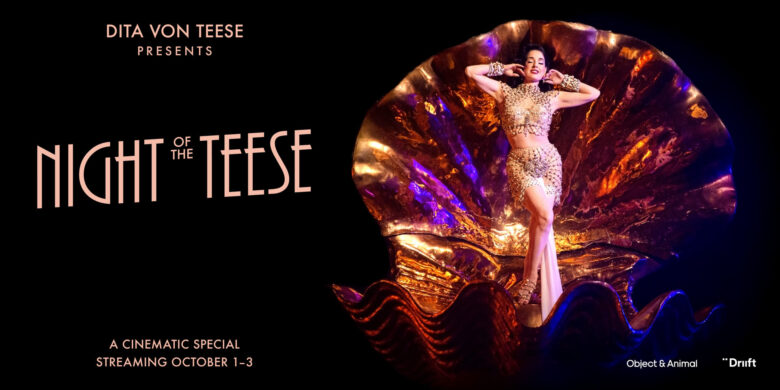 This upcoming show looks super high gloss and cinematic. Can you tell me how you linked up with Quinn Wilson, who directed Night of the Teese, and what you were going for aesthetically?
This upcoming show looks super high gloss and cinematic. Can you tell me how you linked up with Quinn Wilson, who directed Night of the Teese, and what you were going for aesthetically?
I felt like, during lockdown we were seeing all these talk show hosts doing shows from their backyard, and I just kept thinking about how I missed the razzle-dazzle, which felt lost without an audience or without the right lighting and without the camera angles. I just don’t want to do it if we can’t do it right.
I don’t like watching my show and it’s even harder to watch a show from a flat angle, so with Quinn, I thought it would be great if it feels like you’re backstage, if it feels like you’re onstage and you can go all around the stage and get that feeling of you can be super close and see all the action, but still witnessing the whole spectacle.
So, that was what appealed to me about working with her, that she really wanted to capture the fun and the energy of how much fun everyone has together backstage but I really loved how Quinn approached filming each performer differently depending on their act personality, to really showcase those elements individually. A few of the performers had their big comeback for this show, like Marawa had just had a baby and this was her first time back on stage, and she was better than ever.
It was just incredible to watch her and feel her enthusiasm and to get to showcase that. Also Perle Noire had pretty much retired herself from performing. She toured with me for years and years, and I begged her to come back to the stage for this
So, i loved watching how Quinn filmed her performance, because you can really feel the energy of her on stage. She has a genuine love for each of the performers that you can really feel. I felt like I was in capable hands. I didn’t feel like I had to worry. As someone who gets photographed a lot, you can really be in your confidence, but the resulting image can be really far from what you were hoping.
You mentioned working with a lot of old collaborators on this show, but are there any rising talents you discovered while putting this show together that you hadn’t known before?
I’d never worked with Frankie Fictitious before, but had been watching her for a while. It’s not like I can just fly people in from all over the world, so it was amazing getting to work with her and I hope we can work together more.
Can you tell me about the extras around this show? You’re hosting some VIP tutorials?
Yes! We filmed these tutorials at my house, like the one with Dirty Martini, teaching me how to twirl tassels and giving all of her tips on pasties and giving a light lesson on how you might make your own!
I also did a hair and makeup tutorial sitting at my vanity and just showed exactly how I do my hair and makeup. And then I did another one where I pulled dresses out of my wardrobe and, and showed someone how I might like to do a striptease in my living room for my boyfriend or girlfriend or for my cat or dog or whatever, just in front of the mirror!
What is your ideal audience to walk out in front of? Do you usually know when it’s going to be a good or bad night?
We get amazing audiences all over the world. I’m really lucky. We perform a lot in these big, old historic theaters, much like the Orpheum. Usually the capacity is somewhere between twenty-two hundred to thirty-five hundred people. So when that show is sold out and when the curtains open and you can see all these glamorous people that have put on their best looks, whether they’re glamour, or pin-up girls, or drag queens. The energy is so insane. It’s so inspiring just thinking about it. I miss that so much.
I do a lot of fancy parties and I’ve performed for some very fancy people, but I wouldn’t trade all the fancy parties in the world for that one moment to be in a room with 3000 people bringing that energy.
Did you grow up in a sexually liberated kind of home? At what point in time did you harness this sexuality?
I didn’t. I think for me it was all about overcoming my own shyness, stemming back to being in ballet my whole life and being used to looking at my body in the mirror. I remember being in a rinky-dink ballet production of the Nutcracker and watching the teacher yell at somebody who was trying to change their costume in the bathroom. She was like, “This is show business! This is ballet! There’s no time for modesty here.”
You just had to get changed in front of everybody. So that had a lot to do with overcoming my own shyness. Then I started working at a strip club when I was 20 years old and I just kind of did it because I thought it was fun.
I never really thought too much about the nudity. I’ve always had boundaries with what I think is okay or not okay, but I’ve always been interested in exploring those boundaries. That’s why I was a fetish model in the early ’90s. I wanted to be the modern Bettie Page and I never questioned it. I just thought if Bettie Page did it then I can do it?
How did your parents deal with you taking that path?
I went through all that kind of stuff with my parents, but I always maintain that I had independence because I had a job since I was 14 years old. I’ve always been financially responsible for myself. Even in high school I didn’t get lunch money from my parents. I was completely self-reliant, so, I kind of felt like it wasn’t anybody’s place to tell me what I should and shouldn’t do. I didn’t really think anybody had the right to challenge me on it.
I mean anyone who knows me sees past the glamour, and knows I’m pretty much just Heather Sweet from a farming town in Michigan. I eat all my leftovers. I’m totally that girl. I grew up always being worried about money, because my dad didn’t have a job a lot of time, so I’m not extravagant with anything except for the shows.
I never thought I was going to be famous. Maybe I thought I would be a famous burlesque star, but to me that meant being on a billboard for a strip club in Fond Du Lac, Wisconsin! I reveled in that moment. I was super happy to be in Pittsburgh, working at the truck stop doing my martini glass show. That’s the reality of some of the dues I’ve paid, in case people don’t know.
You’ve been in films, and made records, and now you’re on Dancing With The Stars…
I also did The Masked Dancer a few months ago in the UK!
What was your animal?
I was a beet. I was a dancing beet root.
Do you get to pick your character?
Kind of, but basically they gave me two costume options knowing full well which one I would pick. They’re like, let’s give her this one with a big baggy oversized hip hop outfit or let’s give her this one with like the little beet root legs and the ballroom-dance style outfit covered in rhinestones….So they play all sorts of tricky things on you with these shows.
In terms of your goals, was expanding into different types of performance something you wanted to explore or is it something that you’ve slipped into because you’re famous?
I kind of slipped into those things more as a way of challenging myself. I remember when I had my big moment when I was on the cover Playboy back in a time where everybody knew who was on the cover of every Playboy back in the day when celebrities did it.
At the time, whoever was representing me tried to convince me to make the move into acting, but I was like, “No, I want to be the greatest stripper!”
Sebastian Tellier asked me to make an album, but I can’t sing. He gave me confidence to step out of my comfort zone. I’m glad that I got to put myself in a vulnerable place with somebody who’s so talented.
Do you ever get the opportunity to reconnect with burlesque as an audience member and sneak into a smaller show just to check it out?
I want to go see burlesque shows, but sometimes when I go, I’m conscious of taking attention from what’s going on on the stage. I love to go though. That’s how I found a lot of my favorite burlesque stars, because there’s nothing like seeing somebody and how they are in the room when you can really get a feel for how they will be as part of the show.
It’s not that easy to command an audience that big, when going from a smaller room to a huge one. I’ve worked with a lot of people who thought they could do it and couldn’t, so its a very special talent.
In terms of the timing of this show what do you think the world needs now that they can only find in burlesque?
I think if I were going to say what the world needs now is, is just an opportunity to celebrate all of our bodies. Burlesque is the place to see other people like you, and you can also see why your body should be celebrated and your sensuality should be celebrated.
This is why I continue to do it. I think it’s a really empowering and important place and holds a lot meaning for people. I think people might laugh at that, but I don’t care because I think there are a lot more people who get what I’m talking about than people who don’t!
— Q&A by Kevin Hegge (@theekevinhegge)

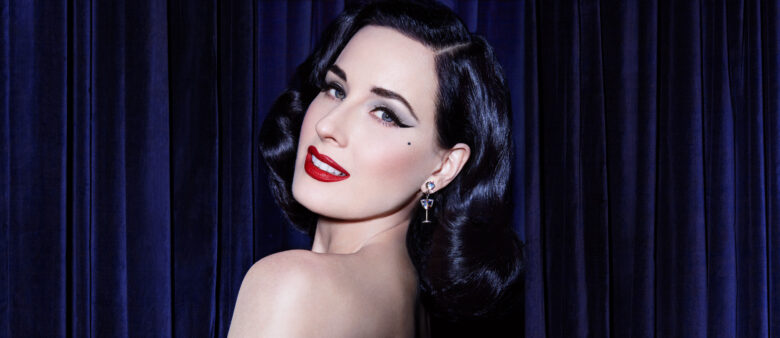
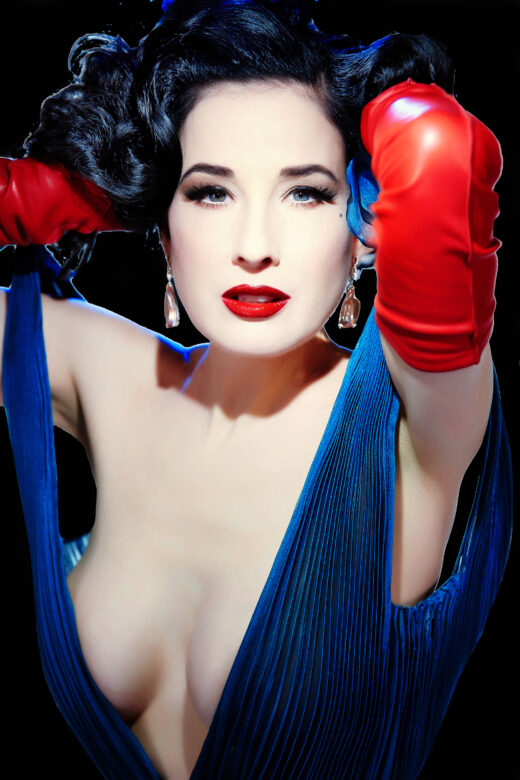
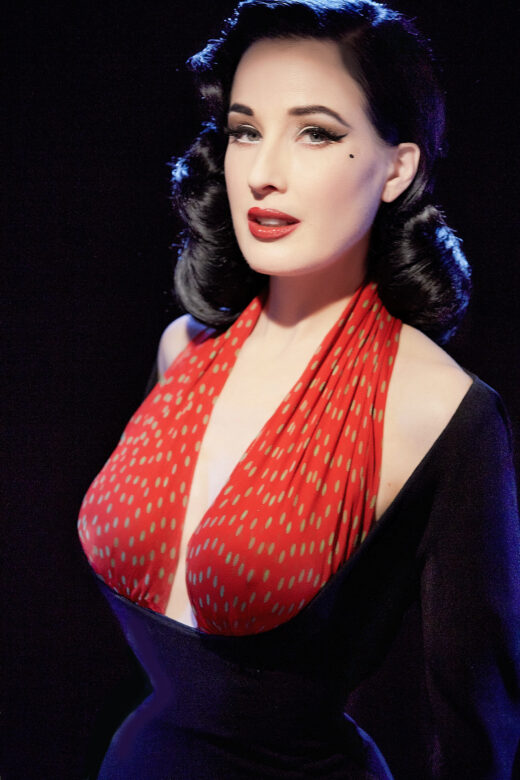
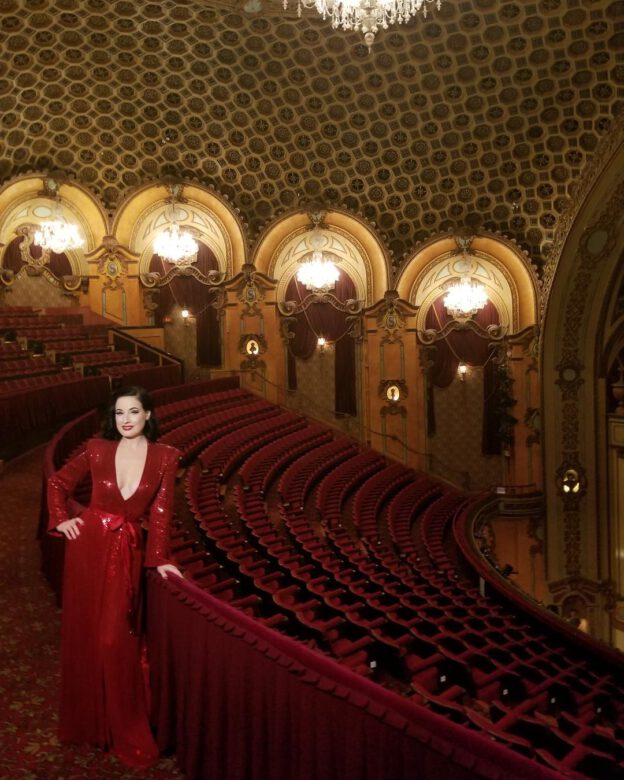
Be the first to comment on "OMG, a Q&A with Dita Von Teese"